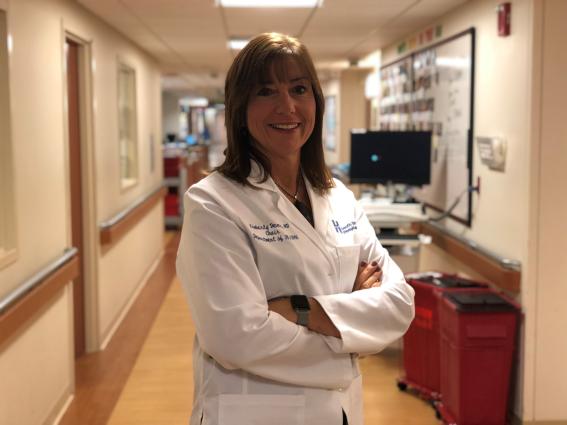Isenberg Online MBA Empowers Physicians in Leadership Roles
December 5, 2019

Finance and patient performance metrics, notes Scott, have become critical in healthcare organizations because “medicine has gone from a system that emphasizes fees for service to a focus on outcomes. We can’t just throw unlimited investments and services around,” he emphasizes. “We need to be more accountable both to consumers and in resource utilization and performance. To that end, metrics are indispensable.”
Online MBA student and ob-gyn Kimberly Dever, MD, FACOG, also felt she needed to know more about the business side of the profession in order to make strategic moves that benefit both her patients and her practice. “Isenberg is helping me to use metrics and data to make wiser business decisions,” she continues. “I’m better able to define and justify resources in business proposals.” Last April, Dever became Vice President of Medical Affairs at South Shore Hospital in Weymouth. Her position is the equivalent, she says, of chief medical officer in many hospitals. She has also been chair of her hospital’s obstetrics and gynecology department since 2011.
Imparting business skills to physicians has been a priority for Isenberg’s online program throughout its twenty-year history. Currently, 375 physicians comprise about 26 percent of the program’s 1,500 students. The lion’s share enroll through a partnership between Isenberg and the American Association for Physician Leadership. “Our ‘docs’ are a differentiator for us in the online market,” observes Isenberg’s MaryBeth Kimball, the program’s chief advocate/marketer for more than a decade. “Our timing,” she adds, “couldn’t be better because there’s been a shift in healthcare organizations away from administrators with non-medical, business backgrounds to physicians with management training.”
A Rapid Response Perspective
As a practitioner, Christopher Scott focuses on emergency medicine. Alongside his administrative responsibilities, he continues to devote one day each week to hands-on work in his site’s Orlando emergency department. “I don’t want to lose those skills,” he confides. “In the boardroom, my experience lets me say, This is what I did. My point of view carries more weight. It gives me an edge. Because it spans the broad medical spectrum, my ER background allows me to walk into any situation.” And, he adds, the high risk and instant outcomes of emergency work inform his perspective as a manager. “In the boardroom, I frame solutions as very calculated and definitive so that the choices will have an immediate impact. I want us to move with agility, especially as technology advances.”
Scott has been at Envision since 2009. He earned his medical degree from Howard University and completed his residency training at Emory University. His bachelor’s degree in biology is from the University of Virginia. As a busy husband, father of four, and health system executive, Scott points out that the art of time management is essential. He dedicates early mornings (pre-5 a.m.), to his Isenberg studies, before his family awakes. “These moments of silence in the house are rare, and must be fully utilized.”
As a Jamaican dual citizen of the Caribbean Community (CARICOM), Scott stays connected with family members and friends in Jamaica, maintaining his Caribbean roots through regular relief work as an International Ambassador through the American College of Emergency Medicine. Last September, in the aftermath of Hurricane Dorian, he coordinated medical teams and did hands-on work on Grand Bahama Island. Most of its residents, he recalled, had lost everything in the wake of the storm and its 180 mph winds. With the airports out of commission, islanders had to rely on boats for medical supplies, food, and water. “With my emergency medicine skill set, I can just show up and jump right in,” Scott remarks.
Shortly after the interview for this profile, he traveled to Jamaica to do community work at Cornwall Regional Medicine Center in Montego Bay. “My business education has really paid off,” he observes. “It’s helped me to do a lot of things better and to have a greater impact.”
New Skills for Expanded Challenges

Her business training has helped her become conversant on such administrative issues. “My online MBA courses are helping me as a healthcare administrator to close critical knowledge gaps,” she says.
The relationship between physicians and their patients, however, will remain “special” and difficult to measure. Dever vows to keep that relationship front and center as she pursues organizational improvements. To that end, she devotes one day a week to hands-on practice in the hospital’s ob-gyn practice. “I work with physician’s assistants, nurse practitioners, and midwives. I love it. It’s a team sport.”
Dever also credits the Isenberg online MBA program with supporting development of her “soft skills” like leadership and team building. “In my current role, I work in a triad with the hospital’s business and nursing partners,” she observes. “The three of us manage and assess the hospital’s staffing, physical resources, and quality. We look out for one another.”
Although making time for her Isenberg studies hasn’t been easy, Dever says, “I have prioritized the work for the classes and know that it’s a temporary situation while I’m pursuing the degree.” She adds, “The return on the investment of the time for the knowledge absolutely makes it worthwhile.”
Dever has been at South Shore Hospital since 2002. She earned her MD from Boston University Med School in 1992 and did a residency at Walter Reed Army Medical Center. She then joined the U.S. Army, achieving the rank of major on her way to becoming chief of the obstetrics and gynecology department at the Army Medical Hospital in Wuerzberg, Germany. “It was a privilege to care for our soldiers,” she affirms. “The Service gave me exceptional training in both medicine and leadership. As a young physician, it helped me develop leadership responsibilities.” Dever has built a career on that combination of medical practice and leadership. Today, through Isenberg, she is adding critical management skills to her toolkit.